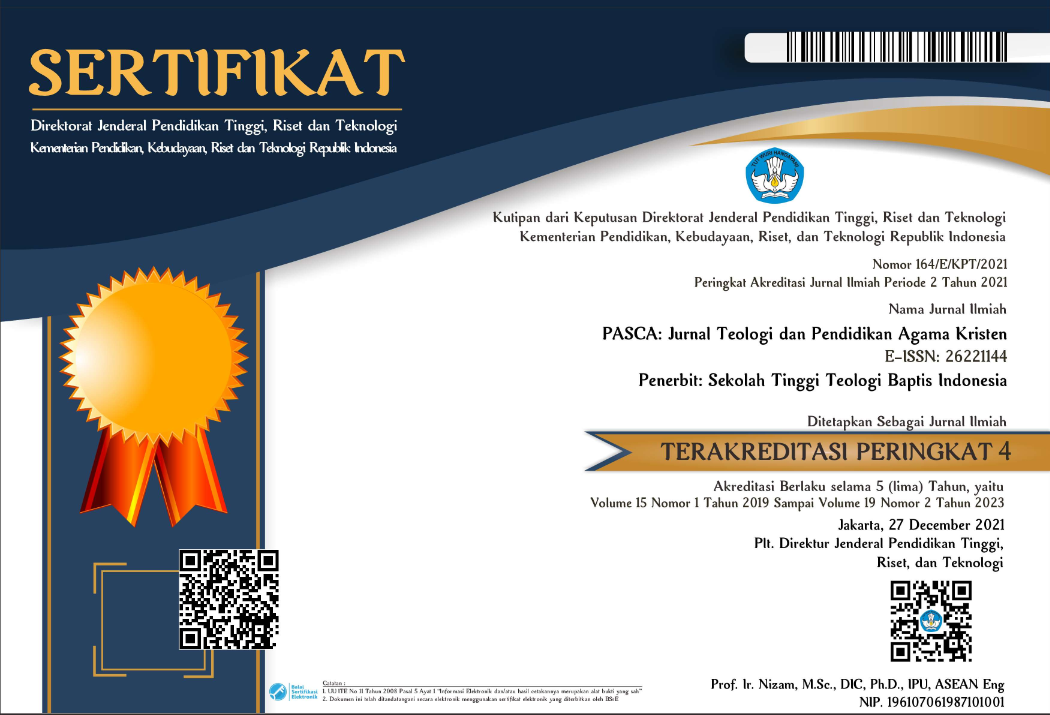The Concept of Man in Anthropology-Christian Theology: Answers to Evolutionists
DOI:
https://doi.org/10.46494/psc.v18i1.187Keywords:
christian teacher, evolutionism, image, likeness of God, humansAbstract
The evolutionist view of humans has a negative influence on education, especially Christian education. Teaching the theory of human evolution in science learning in the classroom makes nature doubtful as God's creation. This is a challenge for Christian educators, for teaching the truth about human nature as the image and likeness of God. Christian educators must be equipped with a Christian theological anthropological understanding of human nature as the image and likeness of God. The purpose of this paper is to answer the evolutionist view of humans in education based on Christian theological anthropological studies. The research method is literature study. The results of the study concluded that humans, both educators and students, were created in the image and likeness of God who has a soul and body with various unique capacities (such as will and knowledge). Humans act as representatives of God on earth who have dominion over the rest of creation and have a special relationship with God as spiritual beings.
References
Antika, Linda Tri, and Lukluk Ibana. “Korelasi Antara Identifikasi Miskonsepsi Teori Evolusi Dan Hasil Belajar Mahasiswa Pendidikan Biologi.” Jurnal Pendidikan dan Kebudayaan 3 (2018): 117–128.
Batten, D., Catchpoole, D., Sarfati, J., & Wieland, C. The Creation Answers Book. Australia: Creation Book Publishers, LLC, 2010.
Bavinck, H. Dogmatika Reformed. Surabaya: Momentum, 2012.
Berkhof, L. Teologi Sistematika: Doktrin Manusia. Vol. 2. Surabaya: Momentum, 2015.
Birx, H. J. 21st Century Anthropology: A Reference Handbook (Vol 1 & 2). Thousand Oaks, California: SAGE Publications, Inc, 2011.
Blancke, S., Hjermitslev, H. H., & Kjærgaard, P. C. Creationism in Europe. Baltimore, Maryland: Johns Hopkins University Press., 2014.
Brooker, R. J. Genetics: Analysis & Principles. New York: McGraw-Hill Companies, Inc., 2012.
Coyne, J. A. Why Evolution Is True. New York: Oxford University Press, 2009.
Culver, R. D. Systematic Theology: Biblical and Historical. Ross-shire: Christian Focus Publications, Ltd., 2005.
Erickson, M. J. Christian Theology. Grand Rapids, MI: Baker Academic., 1983.
F, Holmes Arthur. Segala Kebenaran Adalah Kebenaran Allah. Ke-5. Surabaya: Momentum, 2009.
Fuentes, A. Biological Anthropology: Concepts and Connections. 2nd ed. New York: McGraw-Hill Companies, Inc., 2012.
Gulo, W. Strategi Belajar-Mengajar. Edisi ke-4. Jakarta: Grasindo., 2008.
Hoekema, A. A. Manusia: Ciptaan Menurut Gambar Allah. Surabaya: Momentum, 2008.
Kilner, J. F. Dignity and Destiny: Humanity in the Image of God. Grand Rapids, Michigan: Wm. B. Eerdmans Publishing Co., 2015.
Knight, G. R. Filsafat & Pendidikan Kristen: Sebuah Pendahuluan Dari Perspektif Kristen. Tangerang: Universitas Pelita Harapan Press., 2009.
Langdon, J. H. The Science of Human Evolution. Indianapolis: Springer International Publishing Switzerland., 2016.
Meyer, S. C. Darwin’s Doubt: The Explosive Origin of Animal Life and the Case for Intellligent Design. New York: HarperOne., 2013.
Miller, Daniel K. “Responsible Relationship: Imago Dei and the Moral Distinction between Humans and Other Animals.” International Journal of Systematic Theology 13, no. 3 (2011): 323–339.
Moreland, J. P., & Ciocchi, D. M. Christian Perspectives on Being Human. Eugene, OR: Wipf and Stock Publishers., 2015.
Poythress, Vern S. Redeeming Science: A God-Centered Approach. Wheaton, Illinois: Crossway Books, 2006.
Putz, Oliver. “Social Apes in God’s Image.” Zygon 44, no. 3 (2009): 613–624.
Raven, P. H., Johnson, G. B., Mason, K. A., Losos, J. B., & Singer, S. R. (2011). Biology. Vol. 9th.ed. New York: McGraw-Hill Companies, Inc., 2011.
Reece, J. B., Urry, L. A., Cain, M. L., Wasserman, S. A., Minorsky, P. V., & Jackson, R. Biology. 10th.ed. New York: Pearson Education, Inc., 2014.
Saputra, Alaninda. “Persepsi Mahasiswa Calon Guru Biologi Tentang Pembelajaran Materi Evolusi Di SMA: Studi Kasus Mahasiswa Pendidikan Biologi FKIP Universitas Sebelas Maret Surakarta.” Bioeducation Journal 1, no. 1 (2017): 2354–8363.
Saragi, Marojahan. “Ancaman Evolusionisme Terhadap Pendidikan Kristen.” Kurios 3, no. 1 (2018): 40.
Sari, Milya, and Asmendri. “Penelitian Kepustakaan (Library Research) Dalam Penelitian Pendidikan IPA.” Penelitian Kepustakaan (Library Research) dalam Penelitian Pendidikan IPA 2, no. 1 (2018): 15. https://ejournal.uinib.ac.id/jurnal/index.php/naturalscience/article/view/1555/1159.
Sidiq, Yasir. “Evolusi Dalam Kehidupan Sehari-Hari?: Sudut Pandang Mahasiswa Terhadap Evolusi.” Proceeding Biology Education ConferenceProceeding Biology Education Conference 13, no. 1 (2016): 583–586.
Stanford, C., Allen, J. S., & Antón, S. C. Biological Anthropology: The Natural History of Humankind. 4th.ed. New York: Pearson Education, Inc., 2017.
Suryana, Dadan. Pendidikan Anak Usia Dini: Stimulasi & Aspek Perkembangan Anak. Jakarta: Prenada Media, 2016.
Tety, and Soeparwata Wiraatmadja. “Prinsip-Prinsip Filsafat Pendidikan Kristen.” Evangelikal: Jurnal Teologi Injili dan Pembinaan Warga Jemaat 1, no. 1 (2017): 58.
Tung, K. Y. Filsafat Pendidikan Kristen: Meletakkan Fondasi Dan Filosofi Pendidikan Kristen Di Tengah Tantangan Filsafat DuniaNo Title. Yogyakarta: Andi, 2013.
Widianing, Oda Judithia. “Pendidikan Kristen Di Sekolah: Sebuah Tugas Ilahi Dalam Memuridkan Jiwa.” Jurnal Teologi Berita Hidup 1, no. 1 (2018): 78–89.
Published
How to Cite
Issue
Section
Copyright (c) 2022 Ferminto Mendrofa, Lastiar Roselyna Sitompul
PASCA: Jurnal Teologi dan Pendidikan Agama Kristen is licensed under a Creative Commons Attribution-ShareAlike 4.0 International License.



























